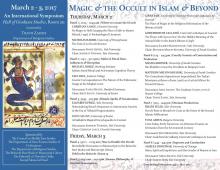This symposium addresses the place of the occult in Islamic epistemology broadly construed, by bringing together an array of scholars across several disciplines and areas of expertise. As a branch of knowledge, the occult sciences came to occupy a very important and often quite normative role in numerous arenas of religious authority and social praxis, from the court to the madrasa, and beyond. In this two-day symposium, participants will present and discuss papers on a variety of issues that pertain to the theme of occult learning in Islamic history, touching on such topics as: statecraft and astronomical divination, demonology, sorcery, and exorcism, material and visual cultures of the occult, bibliomancy, talismans, and magic bowls, parallels and precedents in the diverse religious milieu of Mesopotamia and beyond, the cultivation of occult learning by the religious elite and its transmission and circulation across religious communities, the epistemic frameworks governing the modern scholarly reception of the occult, and reform and modern adaptations and continuations of pre-modern practices.
